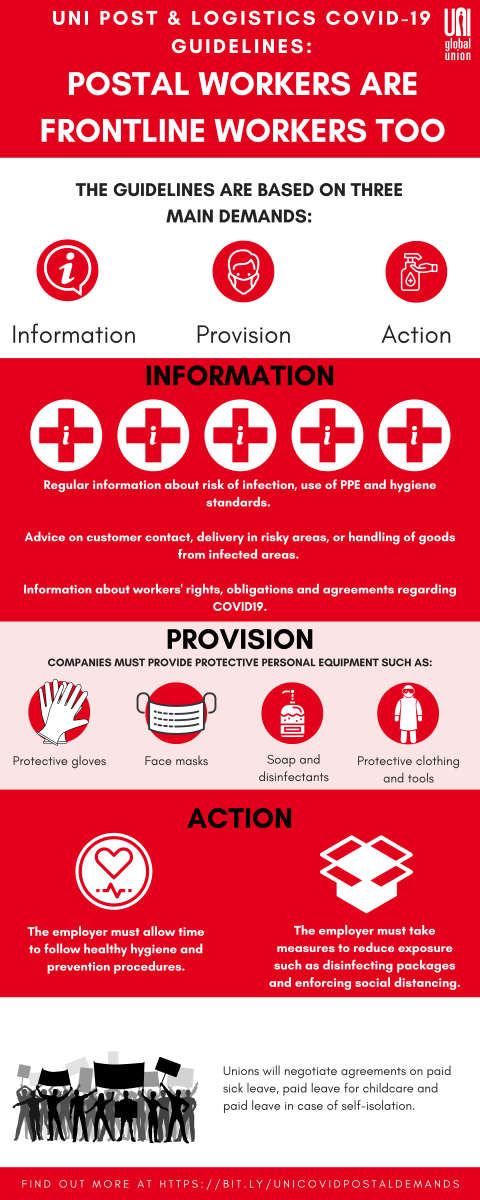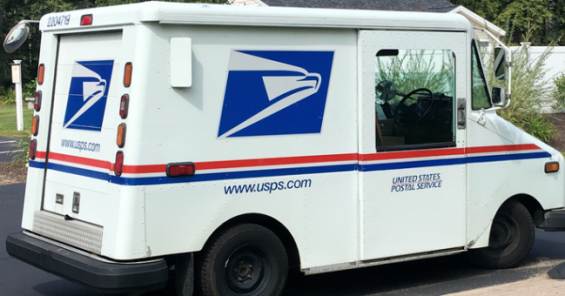As postal workers become increasingly concerned about their exposure to COVID-19, UNI Global Union has produced a set of health and safety precautions for unions in the post and logistics sector.
Postal workers from UK to USA, and Spain to Senegal, have complained of a lack of personal protective equipment and other safety measures, as they continue to serve the public during the global coronavirus health pandemic.
A postal worker in Spain died last week and at least 200 postal workers in the country have so far reported positive for the virus. Inevitably, the impact is being felt elsewhere and more than 20 postal workers have already fallen ill with COVID-19 in the US. Workers there say they feel vulnerable and are afraid of unwittingly transmitting the virus to others.
“Post and logistics workers are frontline workers too and serve an essential, if not emergency, service,” says Cornelia Berger, Head of UNI Post&Logistics.
“As trade unions in the sector, we not only have the responsibility to protect our workers and the public, but also to look at how the infrastructure of daily delivery can benefit society as a whole.”
To do that, UNI Post&Logistics is calling for postal services to follow a new set of guidelines:
I-P-A Guidelines
UNI represents 2.5 million post and logistics workers in 90 countries and the I-P-A (Information, Provision and Action) guidelines have been drafted in consultation with UNI affiliates in the sector.

The guidelines aim to help ensure the health and safety for all post and logistic workers, as well as customers globally, and support efforts to stop the rapid spread of the virus. They are based on three main demands:
1. Information:
- Postal workers must be kept informed regularly by the company about the risk of infection, the use of PPE (personal protective equipment) and hygiene standards, as well as how to deal with customer contact, delivery in risky areas, or handling of goods from infected areas. Unions must inform postal workers about their rights and obligations, agreed measures and agreements regarding COVID19.
2. Provision:
- Companies must provide PPE (such as clothing and tools, face masks, gloves, soap and disinfectants) to all workers; ensure regular disinfection of workplaces, work tools and vehicles; and adapt workplaces to allow for adequate distancing between workers themselves, as well as customers (eg. through restricting the number of customers in one room or plexiglass walls) to prevent the transmission of the virus at all postal facilities, such as post offices, sorting centres, distribution centres, breakrooms and warehouses.
3. Action:
- Unions shall negotiate agreements on paid sick leave, paid leave for childcare and paid leave in case of self-isolation for all grades and forms of employment within the company. Unions shall also ensure that measures introduced are properly implemented.
- Companies must give workers the opportunity and time to follow hygiene and prevention procedures; to self-isolate or go on childcare/sick leave; and to refuse risky deliveries, the handling of risky goods or the provision of services to customers of risk.
- Companies must implement actions to lower the risk of infections including measures such as the introduction of telework where possible; the systematic quarantine and disinfection of goods; the introduction of a non-signature drop-off system that allows customers to receive a parcel without face-to-face interaction with letter carriers and deliverers; a reduction in payments by cash in favour of cards; and 15 days of mandatory quarantine for workers who have been in contact with infected persons.
The National Association of Letter Carriers (NALC) in the US says it is working closely with postal management to keep their members safe, focusing on safe working protocols, expanded leave for those exposed to the virus and overcoming supply shortages for hand sanitizer, gloves and disinfecting wipes.
“The work letter carriers perform every day plays a vital role to the people of the United States. During this challenging time, that role becomes even greater as we deliver lifesaving and life-sustaining goods to our customers to assist them through this outbreak. Letter carriers are known for the crucial work they perform serving the public, especially in times like this. We urge every postal employee to take every precaution to protect yourself, your coworkers, and your customers,” NALC President Fredric Rolando told UNI.
In the UK, postal workers’ union, CWU, says its members are ready to keep delivering through the pandemic but only if workers are safe. The union has been pushing Royal Mail hard for better safety protections, including safety distancing and the cessation of van sharing. The union has also ensured that self-isolation and time of work due to COVID-19 does not count as sick leave and that full basic pay will be maintained.
“It is important that we obtained key worker status, but nothing comes before making our people as safe as they can be. But there is a long way to go,” said CWU general secretary, Dave Ward. CWU reps are working tirelessly to ensure that safety rules are implemented as safety equipment and standards vary from office to office.
As Pakistan goes into partial lockdown after a sharp rise in cases, UNI has written to the government and management of Pakistan Post, urging them to engage with unions to carry out a comprehensive risk assessment, and to adapt services and work methods to protect all postal workers in the country.
“Urgent action clearly needs to be taken to maintain the health of postal workers and the operability of postal services in the face of this crisis,” said UNI’s Cornelia Berger. “These guidelines are an important first step.”


